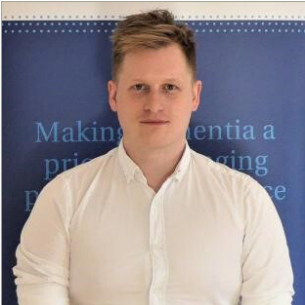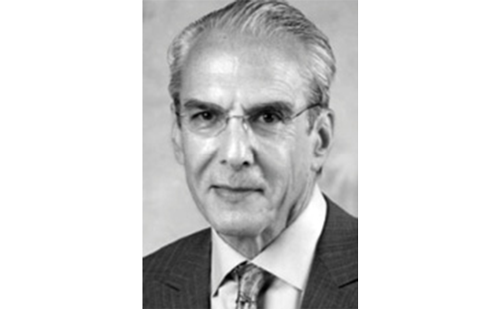The report entitled “Sex, gender and sexuality in the context of dementia: A guide to raise awareness amongst health and social care workers“ is a guide published by Alzheimer Europe that offers practical advice to health and social care workers on how to address issues related to sex, gender and sexuality in the context of dementia.1 The guide emphasizes the importance of adopting a person-centred approach to care and offers strategies for promoting open and honest communication with individuals living with dementia. The guide offers guidance on how to support individuals experiencing changes in their sexual desires or behaviours and provides advice on creating a safe and respectful environment for individuals living with dementia to express their sexuality. The guide provides a valuable resource for health and social care workers in a variety of settings and has the potential to improve the quality of care provided to individuals living with dementia.
In this expert interview, Dr Dianne Gove (Director for Projects, Alzheimer Europe, Luxembourg) and Mr Jean Georges (Executive Director, Alzheimer Europe, Luxembourg) discuss the defining aims and goals of the guide, including how the guide will contribute towards challenging the assumptions and inequalities in dementia and about people living with dementia, and its key take–home messages.
Q. What misconceptions persist around sex, gender and sexuality in people living with dementia?
There are many misconceptions surrounding the gender identities of people living with dementia, sometimes resulting in the provision of services and support that are gender based, do not correspond to people’s real interests and needs, and fail to respect and protect people from homophobic and transphobic attitudes and behaviours. There are also numerous misconceptions around the issue of sexuality, which are partly linked to ageism, ableism and gender stereotypes.2 For example, it is often assumed that older people are not interested in sex and are not sexually active. Those who do exhibit sexual behaviour, especially in the care home setting, may be considered deviant (exhibiting “sexually inappropriate behaviour“) or victims of sexual abuse. Obviously, it is important to ensure that people with dementia are not subjected to abuse, but at the same time, it is important to avoid making assumptions about their capacity to engage in a sexual relationship, which cannot be assumed based on incapacity in other areas of life, and/or about their need and desire for physical contact and close relationships, which may lead to a failure to respect their right to sexuality.
Q. What led to the development of the guide “Sex, gender and sexuality in the context of dementia: A guide to raise awareness amongst health and social care workers”?
Sex, gender and sexuality are fundamental aspects of our lives, which influence how we see ourselves, how others see us and our position in society. In recent years, there has been increasing awareness about sex, gender, and sexuality and the many different gender identities and sexual orientations that people have. Unfortunately, there is still a lack of information on this topic in dementia care, where this central part of our identities is all too often invisible. Europe is still highly influenced by heteronormative assumptions (i.e. that everyone is heterosexual, identifies with the sex attributed to them at birth and lives in a close-knit biological family), and this is also the case in dementia care and support. The societies we live in have developed structures of care and support around these assumptions, which, unfortunately, often reflect homophobia, transphobia, ageism and ableism. This is reflected in negative stereotypes about the sexuality of older people and people with dementia and broad generalizations about what men and women with dementia want or need in life and what is considered “normal“ or acceptable behaviour.
Q. What are the defining aims and goals of the guide?
The aims and goals of this guide are to promote reflection, to contribute towards challenging assumptions and inequalities relating to individuals living with dementia and to help ensure that everyone is free from violence, discrimination and harassment irrespective of their sex, gender identity or sexual orientation.
Q. How will the guide contribute towards challenging the assumptions and inequalities in dementia and about people living with dementia?
We hope that the guide will help people to become aware of the heteronormative assumptions that permeate society, to recognize structural discrimination (not only against people from lesbian, gay, bisexual, transgender, queer/questioning, and others [LGBTQ+] communities but also against older women and single people, especially those without children) and to strive for fair and humane treatment of all people with dementia. We start from the assumption that such attitudes, practices and structures are deeply ingrained in society but that most people are not deliberately discriminatory or hostile. This guide will hopefully motivate health and social care professionals to take action where needed and give them the information needed to do so. We realize that this will not happen overnight, and this guide is part of a more global move to bring about much–needed changes.
Q. What are the key take-home messages from the publication of this guide?
The key messages of this guide are that anyone can develop dementia (men, women, intersex people and non-binary people, people living alone or with a partner, people who are sexually active or not). The experience of LGBTQ+ people is often qualitatively different to that of non-LGBTQ+ people, and they encounter several issues that others do not. However, other groups, such as straight men, older women who live alone and people who do not have children (regardless of their gender identity or sexual orientation), also encounter challenges and experience some forms of discrimination in the context of dementia care and support, as do their biological families, families of choice, carers and, in some cases, health and social care workers. We need to ensure that everyone with dementia feels accepted and valued for who and what they are, that they feel safe to be open about their gender identities and sexual orientations, and that they can all enjoy the same rights, respect and opportunities as other members of society.














